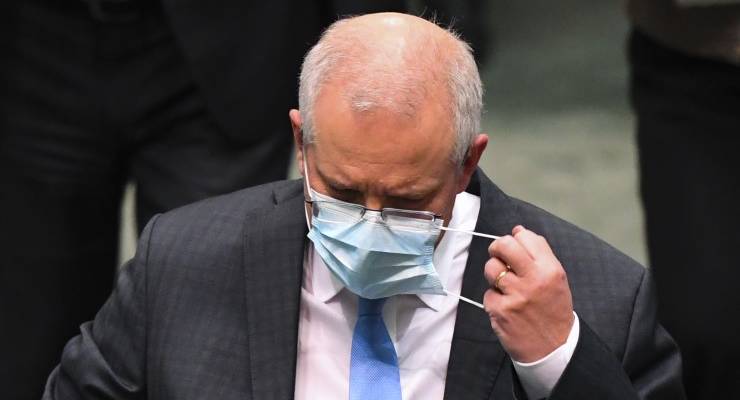
Qantas is the second large employer of Australian workers to say it will do what Scott Morrison won’t: mandate COVID vaccinations for its workforce.
Every employer in the country is asking the same questions: can I force my staff to get vaccines? Or what if I don’t and vaccinated employees refuse to come to work if unvaccinated staff are present? Can I be sued if they, or customers, catch COVID from an employee who refused?
If you’re into singularly unhelpful advice there are plenty of places you can get it. You could try divining what you should do from the words of our leader. Two weeks ago, as SPC became the first big company to announce compulsory vaccination for its workers, the prime minister was clear: “We do not have a mandatory vaccination policy in this country.”
He went on: “Ultimately, employers need to consider these matters and make their own decisions. Where an employee may be at great risk of actually contracting the virus, the employer would be in those circumstances seeking to afford some protection for their staff and upholding — in their view — their obligations regarding the occupational health and safety of their staff.”
It would hardly be possible to be any clearer than that, but Morrison added extra clarification a few days later anyway, responding to desperate calls from industry groups to either make the decision for employers or at least indemnify them if they mandate vaccination and then get sued. No, he said, to both suggestions, because that would amount to mandatory vaccination “by stealth”.
To compound the precision of his advice even further, four days later Morrison said: “It is not reasonable that an employer may feel they have to put some sort of mandate in place to protect themselves potentially from some health and safety laws,” flagging that state regulators could possibly give businesses relief from that risk.
There was no need really for the peak regulator, the Fair Work Ombudsman, to pile on, but it did last week with a wonderfully long guidance note for businesses on all matters vaccinatory. It explains everything, in the sense that the answer to every question one might think to ask is: “It depends, you should consider seeking legal advice.”
It’s not the ombudsman’s fault, nor the business groups, the unions or anyone else really. The fact is, none of our laws was written with a pandemic in mind (apart from the very pandemic-adjacent Biosecurity Act). They’re not equipped for the paradoxes COVID is throwing up.
For some employers, the questions have been answered by legal force. Some industries are subject, by means of public health orders, to mandatory COVID vaccination. They flow from practical necessity. For everyone else, it’s a guessing game.
Say I ran a law firm, hypothetically. Not a high-risk business in terms of public health, like a supermarket or courier company. However, we do interact with each other quite a lot in an enclosed air-conditioned space, and with normal people. That creates a risk which is known, and capable of being mitigated by an obvious measure: vaccination.
The legal calculus is no different from any other workplace health and safety risk: a present and reasonably obvious cause of potential injury to workers and visitors alike, which we could eliminate or effectively reduce to an acceptable level. The law, conventionally, says that if we don’t take that step we will be liable for the consequences.
However, it is one thing to make your employees wear goggles while welding or tick off a 50-page checklist before powering the engines. It is quite another to require them to cop a needle.
For all the ignorant stupidity of the anti-vaxxer brigade, the fact remains that getting vaccinated (or not) is the exercise of a powerful personal right — the right of agency over ourselves. It’s rarely talked about, because we assume its existence as a fundamental attribute of being human. It can be overridden by law, certainly in Australia, where we have no human rights — except freedom of religion — that are immune from legislation.
But it has to be law that does the work here, nothing less. We can see clearly ahead that the presence of COVID risk in the form of unvaccinated workers will be a real problem for all employers. Balancing the rights of individuals against the risks (practical and legal) is simply beyond their ability and should not be their responsibility. If it is left to individual employers, they will make inconsistent choices. The result will be chaotic.
This is a question not for workplaces but for government. As a society we will have to make hard choices about the COVID-filled future, and mandatory vaccination is just one of them. Those choices will need to be turned into law. There’s nothing unconventional about that process.
I am not pre-empting the answer to the mandatory vaccination question. I’m just flagging that it is being asked with increasing urgency and the Morrison government needs to provide an answer. Soon.
Should the government enact laws enabling employers to mandate vaccines in their workplaces? Let us know your thoughts by writing to letters@crikey.com.au. Please include your full name if you would like to be considered for publication in Crikey’s Your Say column. We reserve the right to edit for length and clarity.








Crikey is committed to hosting lively discussions. Help us keep the conversation useful, interesting and welcoming. We aim to publish comments quickly in the interest of promoting robust conversation, but we’re a small team and we deploy filters to protect against legal risk. Occasionally your comment may be held up while we review, but we’re working as fast as we can to keep the conversation rolling.
The Crikey comment section is members-only content. Please subscribe to leave a comment.
The Crikey comment section is members-only content. Please login to leave a comment.